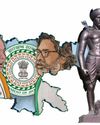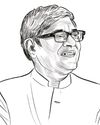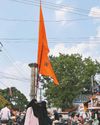
Manipur’s fight against COVID-19 has been peculiarly bipolar. While many have come forward to contribute to the efforts to contain the contagion, others are indulging in hate-mongering and paranoia on social media. If this divide can broadly characterise the psychology of the people, in the government’s actions too, the split has become quite apparent.
Like other states in the Northeast, Manipur has been quite successful in containing the novel coronavirus. It has seen just two cases—the first, a student returning home from London, tested positive on March 24 and the other was a participant of the Tablighi Jamaat congregation at Nizamuddin, New Delhi. Both have now recovered and with fears of widespread infection receding, the state began relaxing the lockdown from April 21 onwards. Manipur shut down on March 21, five days ahead of the national lockdown, partly in anticipation of public unrest at the selection of Manipur’s titular king, Leishemba Sanajaoba, as the BJP candidate for the Rajya Sabha election. The election was scheduled for March 26, but has since been postponed indefinitely. The state’s landlocked geographical remoteness also probably helped in preventing the spread of the disease.
The government has been lauded for providing rations and monetary assistance to the people of the state stranded in other parts of the country. In a video conference with PM Modi on April 11, chief minister Nongthombam Biren Singh raised the issue of discrimination against people from the Northeast in other states during the lockdown. But amid this onerous battle, which, to say the least, is far from over, the state government has also been clamping down on voices of dissent. Even suggestions regarding where the administration could be going wrong in handling the crisis are dealt with a heavy hand.
This story is from the {{IssueName}} edition of {{MagazineName}}.
Start your 7-day Magzter GOLD free trial to access thousands of curated premium stories, and 9,000+ magazines and newspapers.
Already a subscriber ? Sign In
This story is from the {{IssueName}} edition of {{MagazineName}}.
Start your 7-day Magzter GOLD free trial to access thousands of curated premium stories, and 9,000+ magazines and newspapers.
Already a subscriber? Sign In

Trump's White House 'Waapsi'
Donald Trump's victory in the US presidential election may very well mean an end to democracy in the near future

IMT Ghaziabad hosted its Annual Convocation Ceremony for the Class of 2024
Shri Suresh Narayanan, Chairman Managing Director of Nestlé India Limited, congratulated and motivated graduates at IMT Ghaziabad's Convocation 2024

Identity and 'Infiltrators'
The Jharkhand Assembly election has emerged as a high-stakes political contest, with the battle for power intensifying between key players in the state.

Beyond Deadlines
Bibek Debroy could engage with even those who were not aligned with his politics or economics

Portraying Absence
Exhibits at a group art show in Kolkata examine existence in the absence

Of Rivers, Jungles and Mountains
In Adivasi poetry, everything breathes, everything is alive and nothing is inferior to humans

Hemant Versus Himanta
Himanta Biswa Sarma brings his hate bandwagon to Jharkhand to rattle Hemant Soren’s tribal identity politics

A Smouldering Wasteland
As Jharkhand goes to the polls, people living in and around Jharia coalfield have just one request for the administration—a life free from smoke, fear and danger for their children

Search for a Narrative
By demanding a separate Sarna Code for the tribals, Hemant Soren has offered the larger issue of tribal identity before the voters

The Historic Bonhomie
While the BJP Is trying to invoke the trope of Bangladeshi infiltrators”, the ground reality paints a different picture pertaining to the historical significance of Muslim-Adivasi camaraderie